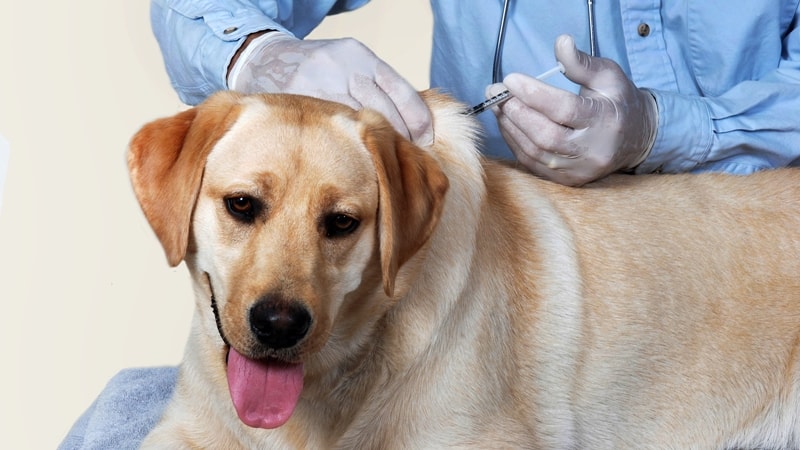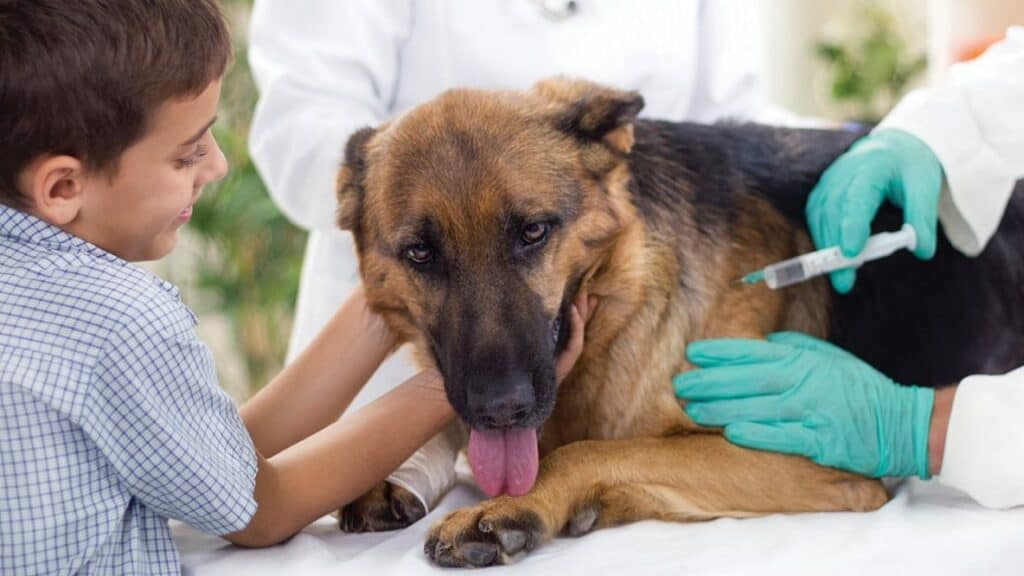- Your Dog Ate Chicken Bones, What To Do? Here Are 5 Important Steps To Follow - July 15, 2022
- How To Stop Dog From Licking Paws – Break The Habit! (Top Causes & Easy Solutions) - February 8, 2022
- 7 Best Fresh Dog Food Delivery Services - December 12, 2019
When you bring a dog into your home, your hope is that you can provide him with the healthiest and happiest possible life. There are many ways to keep your dog happy and healthy, such as proper nutrition, plentiful water, adequate exercise, stimulating play, and proper medical care. One element of proper medical care includes vaccinations for various diseases. There are two kinds of vaccinations: core and noncore. Core vaccinations are those that are highly recommended for all dogs, regardless of breed or location. Noncore vaccinations are optional vaccinations that pet parents may elect to administer based on their dog’s breed, age, circumstance, and lifestyle, such as frequency of exposure to other dogs, travel, activity level, etc. Keep in mind that vaccination schedules vary according to location and many other factors, and are best discussed with your vet about your individual dog, but below are general vaccination schedules for the average dog at each stage of his life, from puppyhood to old age.
Vaccinations for Your Puppy

Welcoming a puppy into your home is a lifelong commitment accompanied by many responsibilities, one of which is making sure your puppy is properly vaccinated, so he can live a long, happy, and healthy life. Puppies require a particularly busy schedule of vet visits to get their vaccinations, but the seeming hassle of multiple trips to the vet during the first few months of your puppy’s life is an investment in his lifelong well-being. While your veterinarian can help you decide what vaccinations are necessary for your particular puppy in the area where you live, a general schedule can be found below for both core and noncore vaccinations.
Core Vaccinations for Your Puppy
According to the American Kennel Club, your puppy should receive several core vaccinations at various stages in his life. When your puppy is between six and eight weeks old, he will be due for vaccinations against distemper, measles, and parainfluenza (kennel cough), though it is important to note that the American Veterinary Medical Association lists the latter two vaccinations as noncore, whereas the AKC lists them as core. We take the stance of better safe than sorry, and thus include them in our list of core vaccinations. Consult with your vet to see what would be best for your puppy.
A few weeks later, when he is between 10 and 12 weeks old, he needs to return to the vet for a vaccination referred to as DHPP, which protects him against distemper, hepatitis, parainfluenza, and parvovirus. Keep in mind that some puppies may require the vaccine for parvovirus as early as five weeks, depending on their living conditions. If you wait until your puppy is 12 weeks old to get his DHPP vaccine, you can save a trip to the vet by also getting his rabies vaccine, which is required by law and can be administered when your puppy is between 12 and 24 weeks old. Your puppy will need to return to the vet for another DHPP vaccine at 14 to 16 weeks, and again at 12 to 16 months. He will also need another rabies shot at 12 to 16 months. Rabies shots will be required by law throughout your dog’s life, every one to three years depending on your location. Consult with your veterinarian to learn what the law is where you live.
Noncore Vaccinations for your Puppy
Recall that noncore vaccinations include vaccinations your puppy may or may not need depending on his breed, location, and lifestyle. The following is a schedule of vaccinations your veterinarian might recommend. Be sure to discuss with your vet which optional vaccinations might be important to your puppy’s current and long-term health.
At six to eight weeks, a vaccine against bordetella might be recommended if your puppy is or will often be exposed to other dogs. If you regularly take your puppy to the dog park, kennel him when you are away, leave him at a doggy daycare during your workday, or plan to enroll him in any group training classes, vaccinating him against bordetella would be wise.
When your puppy is 10 to 12 weeks old, your vet might recommend vaccinations for Coronavirus, Leptospirosis, Bordetella, and Lyme disease. For example, the Lyme disease vaccination might be recommended if you live in an area where ticks thrive, or travel to these areas, or if your puppy will be hiking, etc.. The Coronavirus vaccine might be recommended if your dog will often be exposed to other dogs.
It is also possible that between 14 and 16 weeks, your dog will need to return for Coronavirus, Lyme disease, Leptospirosis, and again at 12 to 16 months, when he may also need another Bordetella shot.
Vaccinations for Your Adult Dog
During the first year of your puppy’s life, the two of you will make frequent visits to the vet for vaccinations, but once he matures into an adult dog, those visits become much fewer and farther between.
Core Vaccinations for your Adult Dog
Recall that core vaccinations are those vaccinations that every dog should get, regardless of location. There are two core vaccinations for adult dogs. The first is the DHPP, which your dog also got as a puppy, and which should be administered every one to two years during his adult life. The only legally required vaccination for dogs in the United States is the rabies vaccine, which, depending on the law where you live, must be administered every one to three years. Check with your vet about the law in your area.
Noncore Vaccinations for your Adult Dog
Depending on conditions where you live and your dog’s lifestyle, your veterinarian may recommend a few optional vaccinations every one to two years, including those for
Coronavirus, Leptotspirosis, Bordetella, and Lyme disease. Because Leptotspirosis can infect and be spread by various wild animals and rodents, as well as by livestock, a vet may recommend your dog be vaccinated against it if you live on or near farms, or in a rural area.
Vaccinations for Your Senior Dog

The definition of a senior dog varies according to the dog’s size. Small dogs under 20 pounds are considered geriatric between the ages of nine and 13. Medium dogs, between 21 and 50 pounds, reach old age between nine and 11 years. Large dogs, 51 pounds and up, are considered senior between the ages of seven and 10. Essentially, the larger the dog, the younger the age at which he earns the label “senior dog.”
There is considerable controversy regarding the over-vaccination of dogs, but of senior dogs in particular. When deciding which vaccinations your senior dog may need, keep in mind the following:
- The rabies vaccine is the only vaccination required by US law regardless of a dog’s age, so even your senior dog will be required to receive the rabies vaccine every one to three years, according to the law in your area.
- Many vets recommend continuing other vaccinations, as well.
- Some vets and pet parents worry about potentially harmful side effects of vaccinating geriatric dogs.
If you fall into the latter category, and are concerned about unnecessarily vaccinating your senior dog, one way to see if he needs or would benefit from vaccinations is through a titer test. A titer test is essentially a blood test that screens for antibodies to determine the strength of your pet’s immune system. Even with a favorable titer outcome, keep in mind:
- antibody levels can change, so the effectiveness of your dog’s immune system can fluctuate
- your dog’s lifestyle may warrant certain vaccinations as a precaution
- the rabies vaccine will be required by law regardless
- there is no titer test for bordetella.
A Lifetime of Health and Happiness
As we discussed, vaccinating your dog from the time he is a puppy throughout his life is one of the most effective ways to make sure he lives a happy and healthy life. While the guidelines provided here can offer you a good sense of what you can do to support your puppy or adult dog’s health, the best course of action would be to have a discussion with your vet about your dog’s particular needs. Every dog is different, and his vaccination needs may vary according to his age, breed, lifestyle, and location, among other variables.
When you do talk to your vet about vaccinations, be sure to make him or her aware of information such as:
- how often your dog is or will be exposed to other dogs (think kenneling or boarding, training classes, dog parks, etc.)
- how often your dog will take excursions and to what degree (Will he often go for walks in the city, for example, or run free on your farm, or will he spend most of his time within the confines of the house and backyard?)
- his living conditions (For example: Does he live with several other dogs? Is your backyard wooded, where ticks may thrive? Is he an outdoor or indoor dog?)
A good starting point for considering what questions you may want to ask can be found here.
Continue reading:
How to Make Your Dog Walk Great




